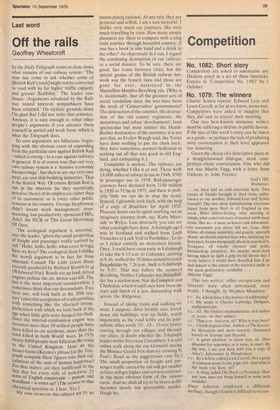Last word
Off the rails
Geoffrey Wheatcroft
So the Daily Telegraph wants to close down what remains of our railway system: The time has come to ask whether some of [British Rail's track] might notbe converted to road with its far higher traffic capacity and greater flexibility.' The leader continues: 'Arguments advanced by the Railway vested interests sympathisers have been rebutted.' On stylistic grounds. alone PM glad that I did not write that sentence. Anyway, it is easy enough to rebut other people's arguments if you advance them Yourself in partial and weak form, which is What the Telegraph does.
Its own arguments are fallacious, beginning with the obvious error of expanding from the particular case against British Rail which is strong to a case against railways in general. It is of course true that our very own railway system is a 'massive economic haemorrhage', but then so are our very own steel, car and ship-building industries. That IS the British Way. Of course British Rail is run in the interests (as they myopically Perceive them) of its employees rather than of its customers: so is every other public concern in the country. George Stephenson didn't invent weak management, overmanning, low productivity, sponsored MPs, Aslef, the NUR or This Great Movement Of Ours.
The ecological argument is unsound,' says the leader, 'given the small proportion Of freight and passenger traffic carried by rail,' Hello, hello, hello, what error in logic have we here? The ecological (how I dislike the word) argument is in fact far from unsound. Consult The Little Green Book recently produced by Richard Boston et al (Wildwood 95p). Roads eat up land, petrol last pollute the air, motor-cats killThe last is the most important consideration. I sometimes think that our descendants. if we have any, will look back at the 20th century's cheerful acceptance of road casualties with something like the shocked incomprehension with which we look back at the age when little girls were hanged for theft. Since the internal-combustion engine was invented more than 50 million people have been killed in car accidents, more than the total killed in both World Wars, In 1976 nearly 8000 people were killed on the roads in the United Kingdom. How do the laisser-fairies (Keynes's phrase )at the Telegraph compute these figures into their calculations of the sum of human ha ppi ness? For that matter, are they indifferent 10 the Inlet that for every mile of motorwaY 25 acres of English countryside pasture and Woodland is eaten up? (The answer to that rhetorical question is. I fear, Yes.) My own views on this subject are by no means purely rational. At any rate, they arc personal and selfish. I am a non-motorist. I dislike very much car journeys, like very much travelling by train. How many simple pleasures are there to compare with a long train journey through beautiful country, if one has a book in one hand and a drink in the other? As objectively As I can, I regard the continuing destruction of our railways as a social disaster. To be sure, there are good, fast trains between cities, hut the special genius of the British railway network was the branch lines and those are gone for ever, destroyed in the Macmillan-Ma rples-Beeching era. (Why is it, incidentally, that all the greatest acts of social vandalism since the war have been the work of 'Conservative' governments? The destruction of the counties, the destruction of the old county regiments, the motorways and urban 'development', least spectacular but most sinister the HeathBarber destruction of the currency: it is not just that, as Evelyn Waugh said, the Tories have done nothing to put the clock back; they have sometimes seemed dedicated to seeking out all that was good in old England, and extirpating it.) Complaint is useless. The railways are dying, whether I like it or not. There Were 19,000 miles of railway in use in 1948, 9300 in passenger use in 1976. Rail-passenger journeys have declined from 21 86 million in 1920 to 715m in '1975, and there is probably 'little we can do to stop the trend. Instead, I gloomily look back, with the help of a copy of Bradshaw for April 1910. Pleasant hours can be spent working out an imaginary journey from, say, Kirby Moorside to Wylya. Less abstractly you can see what you might have done. A fortnight ago I was in Scotland and walked from Loch Venacher to Loch Voil in Perthshire. To do so I relied entirely on motorised friends. Once, I could have risen early in Edinburgh to take the 6.15 a.m. to Callander, arriving at 8.46, walked the 30 miles around to reach Balquhidder by 7.26 p.m., back to Edinburgh by 9.55. That was before the accursed Beeching. Neither Callander nor Balquhidder has a station now. Nor do Compton and Chisledon, which would once have been the start and finish of a less demanding walk across the Ridgeway.
Instead of taking trains and walking we must. I suppose. drive beastly cars, knock down old buildings, tear up fields, watch impotently as the road lobby and its journalistic allies sends 35:, 45-, 55-ton lorries roaring through our villages and through our cities. (I doubt whether the Telegraph leader-writer lives near Canonbury: I would rather walk along the rue Grimaldi during the Monaco Grand Prix than try crossing St Paul's Road as the juggernauts race by.) The small .proportion of freight and passenger traffic carried by rail will get smaller as fares will get higher and services contract, in the most obvious form of the vicious. circle. And we shall all try to be brave as life becomes slowly but perceptibly nastier. Heigh ho.


































 Previous page
Previous page